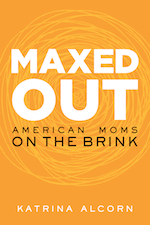The other day I saw Jennifer Siebel Newsom, the First Lady of San Francisco, speak at the Commonwealth Club about women and the media. She’s producing a very ambitious documentary called “Miss Representation,” about how the media under-represents women in positions of power and influence. She showed a short clip of the film, which included snippets of a impressive line up of women, from Nancy Pelosi and Condoleezza Rice to Katie Couric, Margaret Cho and Jane Fonda.
Throughout the talk, a sweet 10-year-old girl wearing fuzzy pink and green legwarmers sat with her aunt on my left, sewing contentedly.
‘How cool,’ I thought. ‘Maybe I can start taking my kids to stuff like this soon instead of stupid Disney movies.’
I admit, I am shielded from many of the negative images of women in the media, because I’ve mostly opted out of pop culture (except for those Disney princess movies we can’t seem to escape…Well, at least that last one wasn’t so bad). Sometimes I watch The Daily Show or The Colbert Report while I fold the laundry, but that’s about it for TV. My husband and I love movies but we’ve all but given up trying to watch them after the kids go to bed, because we can’t stay awake long enough. And I’m one of those obnoxious snobs who actually prefers reading The New Yorker to reading People. Outside of music, my knowledge of pop culture is embarrassingly paltry.
“Do you know who LeBron James is?” my husband asked me the other day. (He likes to plumb the depths of my ignorance every once in a while.)
“Some kind of sports guy?”
“He’s the most famous basketball player in the world.”
“See? A sports guy!”
“Don’t ever change, Katrina…”
So how could the media possibly affect me? Because millions of other people are watching it, and it’s profoundly affecting them. Newsom said it best:
“If you can see it, you can be it. If you can’t see it, you can’t be it.”
The media is our society’s muse. It attends to our collective consciousness. Whether we watch it or not, like it or not, it propels (or limits) our collective imagination. So when our society is bombarded with images of madonnas and primadonnas, princesses and whores, these images worm their way into our understanding of what a woman is.
Where do working moms fit in here?
I asked that question and Newsom had a couple really interesting things to say.
She told us about an interview she did with a big network executive (a woman) who said that the network had to be very careful about integrating working moms into television story lines, because every time they did, the viewers would flood the network with complaints.
Complaints? Yes.
Despite the fact that half of all U.S. workers are women, despite the fact that more than 70% of mothers in America work outside the home, there are still a lot of people out there who find the concept of a mother working distasteful. They don’t believe we can adequately take care of our children if we work.
Who’s running the show here? Is the problem that the public doesn’t see strong, compelling, likable working mom characters, and this limits their imagination? Are viewers truly so resistant to the idea of mothers working that the network’s hands are tied? Or is it the network executives who are resistant? Are the working mothers too busy to watch television, let alone lodge a complaint, so the networks only hear from the small minority of people who can’t relate?
Newsom also said we need stories of capable fathers. Fathers who once knew best are now invariably hapless, incapable, comical characters who can’t hold a job, be faithful to their wives, or take care of children. Homer Simpson is funny, but surely there’s room for other kinds of dads, too. (Yes, even I know who Homer Simpson is.)
This trend to infantilize fathers hurts women; it reinforces the idea that the burden of parenting belongs with the mother alone. And it hurts fathers, too. I know so many fathers (my husband, my cousin Eliot, all those wonderful dads at my kids’ schools) who are loving, capable, thoughtful, reliable parents. They do housework, handle many kid logistics, make compromises in their work schedules to accommodate their families, and do just fine with the kids when mom has to go away on a business trip. A few of them stay at home with their young kids while mom works. The hapless daddy stereotype is a stigma they don’t deserve.
These dads aren’t an anomaly. A recent Newsweek column described how male behavior and attitudes are shifting in surprising ways. For example, they’re spending more time with their children:
…Millennial fathers—those under 29—spend an average of 4.3 hours per workday with their kids, which is almost double that of their counterparts in 1977. A Families and Work Institute report found that these young dads are actually now spending more time each day with children under 13 than mothers between the ages of 29 and 42 are with their own.
They’re doing more housework:
…while women still do most of the housework, men are becoming far more familiar with the sponge and vacuum cleaner, particularly less educated men. Between 1965 and 2003, college-educated men did 33 percent more housework than they did before, and men who never completed high school did 100 percent more, according to research from Oxford University.
And they’re deeply conflicted about working long hours. Studies show married men are now feeling more torn over balancing work and family than their wives are.
We need more stories, better ones, about real women and men raising real families, doing the best they can with what they have, genuinely struggling to do their best as parents, as workers, as citizens, and sometimes all three at once.
I turned to my 10-year-old seat partner when Newsom’s talk was over.
“So what did you think?” I said. “Did you learn anything?”
“Nah, I wasn’t listening,” she said. “But look, I made this.” Then she stood up and show me the new fuzzy pink tube skirt she’d just finished.
What do you think? What stories do you want to see?










{ 6 comments… read them below or add one }
This was a great blog. It made me think of a slightly different topic that I feel really strongly about – TV. There’s lots of research that shows that TOO MUCH TV is bad for kids – particularly advertisements. But instead of looking at the ways in which we communicate with our families, many people have simply villified TV. In our house, we watch TV. It’s not something that I am ashamed of, nor do I feel I should be ashamed of it. We record things, skip the advertisements and use what we watch as a spring board for, gasp!, conversation. Stereotypes – hey, let’s talk about that. Lion eats the lamb – how about we talk about it. Tom never wins against Jerry – why doesn’t he just give up? Raising strong, independant children does not have to mean being a hypocrite about television. I enjoy TV, so why should I not allow my child to enjoy it too? I will never forget – my daughter’s preschool teacher. She is a convert of the WALDORF school, which offers much to the growing child. However, she believed so vehemently in the inherent evil-ness of TV that she actually gave my girl a GUILT COMPLEX about watching TV. As though it was wrong and shameful. Great. Talk about hypocrisy. Common sense is the name of the game, not extremism.
Thanks for this post, Katrina. I would love to see more stories (I also don’t watch TV, so I’m looking for stories in my own community…and on your blog!) of Mom’s who feel like they’ve succesfully created balance (or an inkling of it), and HOW they did it. There are just too few examples of what success (however you define it) and balance CAN look like. Was it with help from a dad/partner who worked less? Was it with help from neighbors kid-swapping? I’m currently looking for answers. I’ve heard some good examples lately (the friend who cooks for another family on Tuesdays – the mom picks up the meal on her way home from work – and then the other mom cooks for her family on Thursdays when my friend arrives home late from work). We’ve recently started picking up a friend’s 4 year old from our son’s pre-school on Mondays to stay w/ us through dinner (so her dad, self-employed, can work with his clients Monday evening), and her dad drops off a pot of soup earlier in the day (since the bane of my existence is getting dinner on the table midweek). It’s amazing how much something little like this starts to create community and make you feel like “OK, i can do this…” What are REAL stories of people making it work? It sounds so crazy that people don’t want to read about those stories in the press…because from your numbers, the target market where all adults in the household are working = BIG. And we need help!
I totally agree that TV and media in general need to acknowledge the realities of working moms. I think it would be nice if our communities did too. Its hard to find a prenatal yoga class that doesn’t take place at 10am, and its also hard to get a slot for a family conference at school that takes place after 5pm.
When I first went back to work after my son was born I was DESPERATE to find a community of women in my same position to get some support or at least have someone to talk to about how HARD it is to go back to work and leave your baby at home or in day care or even in the care of your mother-in-law. The best I could find was urbanbaby which seemed to be populated by spoiled stay at home manhattanite moms who just wanted to flame each other all day. No support there!
I also want to second your comments about Dads. There IS a shift going on and dads are struggling with the work/family balance as much as women are. Dads are more engaged in the partnership of parenting than previous generations were. I see it in my home, I see it (well my husband sees it) in the recess yard and at pick up at school, and I see it in our friends. Almost every family around us has a full time working outside the home mom and a work at home or on a nontraditional schedule dad who is there for pick up and the tote-around after school.
Its appalling that the networks would think that portraying real-life struggles to balance that are dangerous for ratings and causing complaints. And I agree with Liz that the real stories about how real people are making it work are very interesting and should be on TV!
Great post. I have to admit I never really thought about it, but now that you have pointed it out, I completely agree with your take.
Thanks for this interview– just getting around to reading it. Having women as 1/2 the workforce yet there still existing “distasteful” attitudes about working moms is pure INSANITY. Is that attitude promoted by rich people who can afford one income households?
I was unbelievably disgusted by this piece called “Hit And Mrs.” in the LA Times Sunday.
Copy and paster this link: http://www.latimes.com/features/image/la-ig-wife-20100516,0,6867317.story
Yikes, Stepford Wives, round 2 !
Julia, I’m so glad you shared this link. And…Ew! What’s more disturbing? The idea that wives should subvert their needs to their husbands? The total focus on materialism and poising their husbands to push their way up the corporate ladder? And if this is the ideal family and the ideal worker, what does that mean for the rest of us who don’t have stay-at-home spouses to run our households?